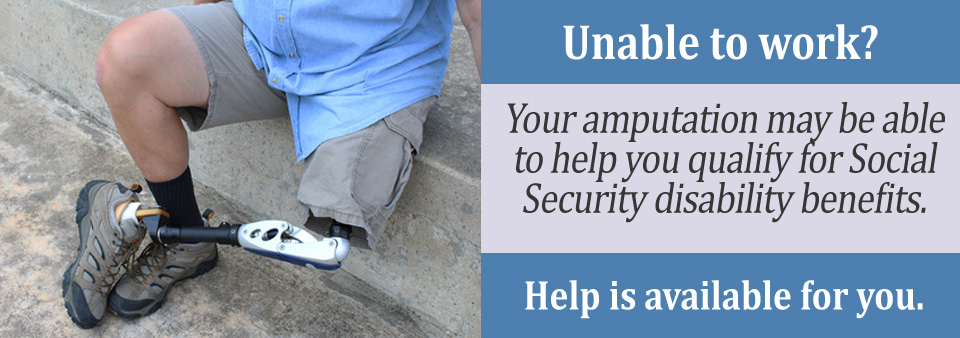If there is one medical condition that should be 100 percent approved by the Social Security Administration (SSA) for disability benefits, it would be an amputation.
However, if the SSA expects you to walk or move your arms effectively within 12 months, then you might receive a denied with amputation claim letter.
Your fight for financial assistance has just started, as you have the right to file an appeal for an amputation disability claim. Working with a Social Security lawyer can strengthen your appeal for denied disability benefits.
Reversing a Denied Social Security Disability Claim
The key to reversing denied Social Security with an amputation is to understand the SSA Blue Book. Created as a guide for medical examiners to use, the SSA Blue Book lists an amputation in Section 1.05.
A team of medical examiners reviewed your initial claim and might have determined that you do not meet the eligibility requirements of an amputation as listed in the Blue Book. This means you have to act with a sense of urgency when filing an appeal for an amputation denied disability claim.
Undergoing an amputation can lead to one or more additional comorbidities that include cardiovascular disease. If the symptoms of an amputation does not qualify you for disability benefits, you might qualify for financial assistance by filing an appeal that covers a comorbidity produced by an amputation.
The Importance of Diagnostic Tests
Medical evidence in the form of diagnostic tests can be your winning ticket for an appeal. Imaging tests can detect any medical concerns at the location where a limb was amputated.
Diagnostic tests can also reveal the severity of the damage done to the area surrounding the amputation, including degenerative bones, tissue, and muscles.
Imaging tests can detect the presence of one or more comorbidities, with a focus on the functioning of the heart and the blood circulatory system. Detection of rapidly forming blood clots can indicate a serious health condition.
Complete Physical and Mental Tests
An effective way to reverse a denied claim for an amputation involves completing a Residual Functional Capacity (RFC) assessment.
A medical examiner from the SSA puts you through a series of tests to determine whether the use of an artificial limb allows you to continue working.
Examples of tests amputees can go through using an artificial limb include simple exercises like walking and doing squats without carrying any weights. You might also have to perform tests that measure the strength of every limb.
Although you go through an RFC with a medical examiner from the SSA, you should ask your physician to conduct an RFC as well to ensure the SSA does not review your appeal with bias.
File an Appeal Before the Deadline
Receiving a denied disability benefits letter from the SSA can leave you feeling down. You must brush yourself off and file an appeal quickly because you have just 60 days to reverse your denied initial claim.
The SSA starts the clock on filing your appeal on the day your received the denied benefits letter. Working with a Social Security lawyer can help you beat the SSA clock, as well as gather the medical evidence you need the second time around to win an appeal.
Schedule a free case evaluation with a Social Security lawyer to learn more about the appeal process for denied disability benefits.
